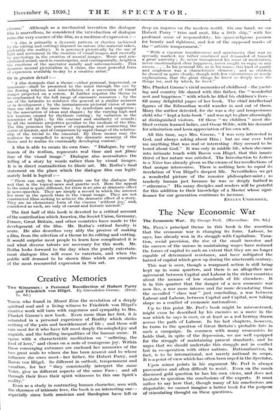The New Economic War
The Economic War. By George Peel. (Macmillan. 10a. 6d.) Mn. PEEL'S principal theme in this book is the assertion that the economic war is changing its form. Labour, he says, has already won in its struggle with Capitalism. 'Taxa- tion, social provision, the rise of the small investor and the success of the unions in maintaining wages have reduced the forces of capital to such an extent that they are no longer capable of determined resistance, and have mitigated the hatred of capital which grew up during the nineteenth century.
This war is over, though a rearguard action is still being kept up in some quarters, and there is an altogether new agreement between Capital and Labour in the richer countries about the menace of low standards of life elsewhere. It is in this quarter that the danger of a new economic war now lies, a war more intense and far more devastating than the so-called " class war " just concluding, a war between Labour and Labour, between Capital and Capital, now taking shape as a conflict of economic nationalism.
Up to this point Mr. Peel's book might be misconstrued; might even be described by his enemies as a move in the war which he says is over, or at least as a red herring drawn across the path of Labour. In his last chapters, however, he turns to the question of Great Britain's probable fate in such a campaign. In common with many economists ho holds that, in spite of the depression, we are well equipped for the struggle of maintaining present standards, and ho urges that we should undertake this struggle not in conflict but in co-operation with other nations. Rationalization, in fact, is to be international, not merely national in scope. It is a point of view which has often been urged in the Spectator.
Upon minor points in his argument Mr. Peel is always provocative and often difficult to resist. Even on the much discussed gold question he has his own views, and does not hesitate to question the conclusions of the experts. It must suffice to say here that, though many of his conclusions are disputable, we cannot imagine a better book for the purpose of stimulating thought on these questions.


























































 Previous page
Previous page